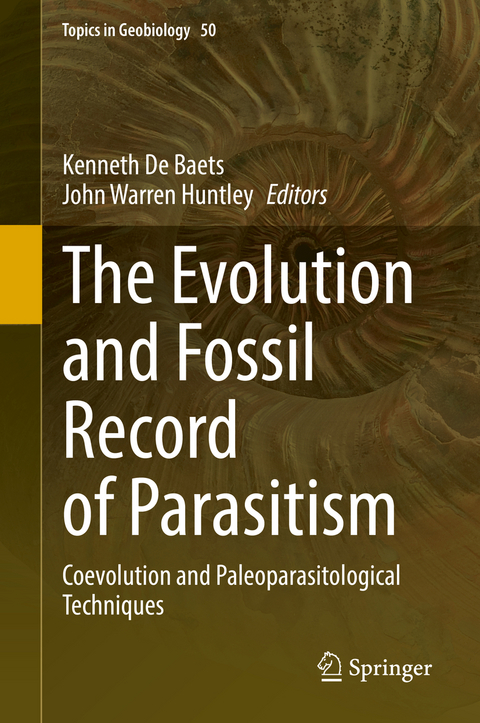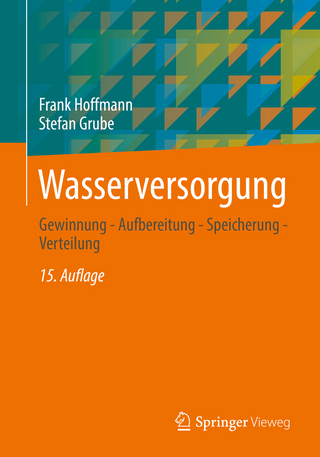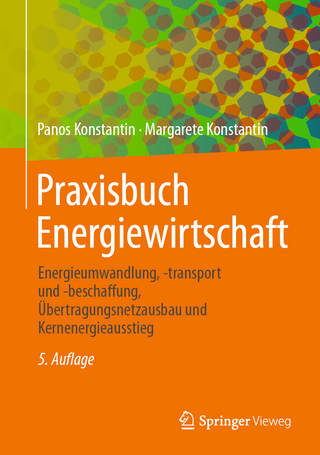
The Evolution and Fossil Record of Parasitism
Springer International Publishing (Verlag)
978-3-030-52232-2 (ISBN)
Volume two focuses on the importance of direct host associations and hostresponses such as pathologies in the geological record to constrain the role of antagonistic interactions in driving the diversification and extinction of parasite-host relationships and disease. To better understand the impact on host populations, emphasis is given to arthropods, colonial metazoans, echinoderms, mollusks and vertebrates as hosts. In addition, novel techniques used to constrain interactions in deep time are discussed ranging from chemical and microscopic investigations of host remains, such as blood and coprolites, to the statistical inference of lateral transfer of transposons and host-parasite coevolutionary dynamics using molecular divergence time estimation.
Dr. Kenneth De Baets is a paleobiologist at the Geozentrum Nordbayern in the faculty of Natural Sciences at Friedrich-Alexander University Erlangen-Nurnberg. He graduated from Ghent University with a Masters in Geology and earned his PhD in Evolutionary Biology at the University of Zürich. His main research focuses on documenting and interpreting the relative contributions of abiotic (e.g., climate) and biotic factors (e.g., parasitism) in driving large-scale patterns in the evolution of life and biomineralization. Dr. John Huntley is an Associate Professor in the Department of Geological Sciences at the University of Missouri. He graduated from Appalachian State University with a Bachelors of Science in Geology in 2000, then earned his Masters in Geology at the University of North Carolina at Wilmington in 2003, and his PhD in Geosciences at Virginia Polytechnic Institute and State University in 2007. His main research interests include the fossil record of biotic interactions, stratigraphic and conservation paleobiology, and the evolution of morphological disparity.
Chapter 1. The fossil record of parasitism: Its extent and taphonomic constraints.- Chapter 2. Importance of data on fossil symbioses for parasite-host evolution.- Chapter 3. Biodiversity and host-parasite (co)extinction.- Chapter 4. Evolutionary history of colonial organisms as hosts and parasites.- Chapter 5. Crustaceans as hosts of parasites throughout the Phanerozoic.- Chapter 6. Trilobites as hosts for parasites: From paleopathologies to ethiologies.- Chapter 7. Evolutionary history of cephalopod pathologies linked with parasitism.- Chapter 8. Bivalve Mollusks as Hosts in the Fossil Record.- Chapter 9. Parasitism of Paleozoic Crinoids and Related Stalked Echinoderms: Paleopathology, Ichnology, Co-Evolution, and Evolutionary Paleoecology.- Chapter 10. Deep origin of parasitic disease in vertebrates.- Chapter 11. Gastrointestinal parasites of ancient non-human vertebrates: Evidence from coprolites and other materials.- Chapter 12. Blood to Molecules: The Fossil Record of Blood and its Constituents.- Chapter 13. The Molecular Clock as a Tool for Understanding Host-Parasite Evolution.- Chapter 14. Horizontal Transfer of Transposons as Genomic Fossils of Host-Parasite Interactions.
| Erscheinungsdatum | 16.12.2020 |
|---|---|
| Reihe/Serie | Topics in Geobiology |
| Zusatzinfo | VIII, 486 p. 69 illus., 41 illus. in color. |
| Verlagsort | Cham |
| Sprache | englisch |
| Maße | 155 x 235 mm |
| Gewicht | 949 g |
| Themenwelt | Naturwissenschaften ► Biologie ► Ökologie / Naturschutz |
| Naturwissenschaften ► Geowissenschaften | |
| Schlagworte | Co-divergence • evolutionary history • extinct lineages of parasites • host response • Identifying parasitism in the fossil record • Insects as parasitoids and parasites • Molecular perspectives • Paleoparasitology techniques • Parasite-induced traces • Protistan parasites • Viral fossils |
| ISBN-10 | 3-030-52232-6 / 3030522326 |
| ISBN-13 | 978-3-030-52232-2 / 9783030522322 |
| Zustand | Neuware |
| Haben Sie eine Frage zum Produkt? |
aus dem Bereich


